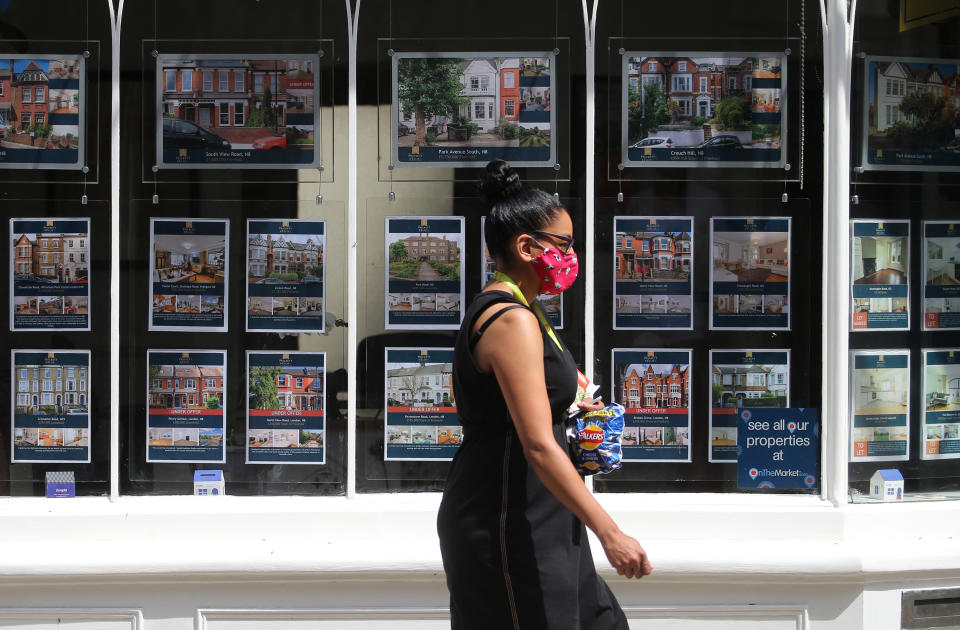What are the chances of buying a home before the stamp duty deadline?

The stamp duty holiday announced in July fuelled a boom in the property market in England and Northern Ireland, sending average UK prices to record highs in 2020.
But the tax cuts, which mean buyers pay no stamp duty on the first £500,000 of a property’s sale price, are only a temporary measure and end on 31 March next year.
Property transactions often take months between a sale being agreed and completed, with the window of opportunity now narrowing fast for buyers and sellers to take advantage.
Many people are likely to be increasingly worried about the ticking clock, from aspiring buyers flicking through property listings to sellers with sales already agreed.
Sales may take even longer than usual during the current crisis, with delays reported as many lenders, conveyancers, estate agents, surveyors and others in the industry overwhelmed by high demand.
WATCH: What do stamp duty cuts mean for buyers and sellers?
Research by consumer intelligence firm Twentyci Group suggests as many as half of all sales agreed between late October and January will not be completed in time—with as many as 325,000 buyers missing out.
Meanwhile property listings site Zoopla’s research and insight director Richard Donnell warned earlier this year any aspiring buyer leaving property-hunting January would be “cutting it fine.”
But getting transactions over the line in time is not out of the question.
How long does it take for average sales to complete?
Zoopla researchers have carried out analysis of average property transaction times to give buyers and sellers a better sense of their chances.
They found the average time between an offer being agreed subject to contract and the actual completion of the transaction—the day the funds, keys and legal ownership change hands—was just under 100 days over the past three years.
READ MORE: Can the UK property and construction boom ride out the winter?
Recent history suggests anyone who has already agreed a sale in October or November has a strong chance of seeing their transaction completed, though it does not appear guaranteed.
97% of October sales in the past three years have been completed by the end of March, and 92% of November sales.

If recent years are anything to go by—an open question given the pandemic and booming demand—then December sales also seem to have a reasonably good chance of completion in time. 81% have been completed by the following April over the past three years, though the apparent one-in-five chance of missing the deadline may feel too close for comfort for some.
David Hannah, founder of stamp duty advisers Cornerstone Tax, told Yahoo Finance UK: “Solicitors are being deluged with instructions and some are already indicating that they will not accept instructions beyond 31 December.”
Transactions start to look much more of a gamble in the New Year, but still better than might be expected in January. Some 54% of January sales have been completed by 31 March in previous years.
February and March are a far riskier bet, unless buyers and sellers have good reason to think they can skip some of the typical hurdles involved in a transaction—like waiting on mortgage approvals, surveys or chain delays.
READ MORE: Average house prices to jump by ‘more than £30,000’ by 2024
Just 17% of sales in recent Februaries have made it over the line by April, and 3% of March sales. Overall, just one in four sales in the first quarter of the year was completed in the same quarter.
Donnell wrote in the Zoopla report in late October: “Those buyers that leave it late to January will need to be well prepared and if they have a house to sell, they should find an agent well before Christmas and instruct a conveyancer to get as much paperwork together as possible to boost the chances of a sale.”
Hannah advised anyone able to “buy for cash and mortgage later” or borrow from family to do so, noting a surge in mortgage applications was likely to cause delays in offers. “Clearly nobody wants to exchange contracts on a property without a mortgage offer in place, and neither would their solicitors let them do so.”
Many property industry figures have called for the tax cuts to be extended, despite the hit to the Exchequer and the risk it hinders rather than helps first-time buyers by pushing up prices.
Hannah said there would be a “perfect storm” of not only buyers seeking to exploit the holiday, but also overseas buyers rushing to avoid a new 2% levy that comes into force on the same date. He said the surcharge should be postponed, “taking the pressure out of the available supply of conveyancing services.”
The backlash if many current buyers miss out mean the deadline could well be pushed back, but the chancellor is yet to budge.

 Yahoo Finance
Yahoo Finance 